
Betty Blonde #216 – 05/14/2009
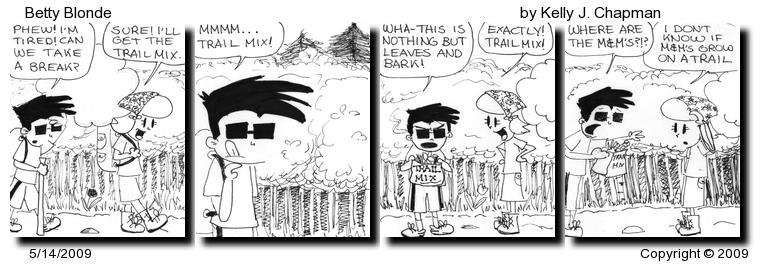
Click here or on the image to see full size strip.


Betty Blonde #216 – 05/14/2009

Click here or on the image to see full size strip.
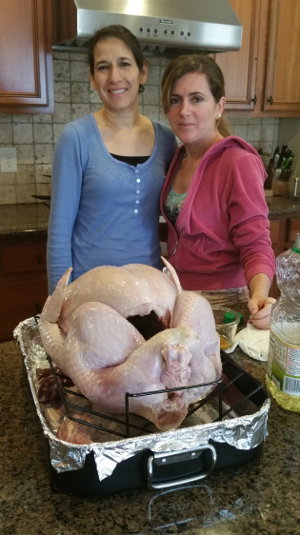 This is the first year our family has ever been split up for Thanksgiving. The kids, off at college on the west coast, will have Thanksgiving at their Aunt Julia’s house in Portland with Grandpa Milo, Grandma Sarah and a bunch of cousins. Lorena and I will have Thanksgiving here in North Carolina with Lorena’s aunt and uncle, Juan and Irma from San Antonio, her cousin Beto and his wife and three little girls from Dallas, and our friends from church, Emilio and Rocio and their son Pedrito and Rocio’s sister. The conversation here in North Carolina will almost certainly be 99% in Spanish. We hope to put up a few pictures later in the day.
This is the first year our family has ever been split up for Thanksgiving. The kids, off at college on the west coast, will have Thanksgiving at their Aunt Julia’s house in Portland with Grandpa Milo, Grandma Sarah and a bunch of cousins. Lorena and I will have Thanksgiving here in North Carolina with Lorena’s aunt and uncle, Juan and Irma from San Antonio, her cousin Beto and his wife and three little girls from Dallas, and our friends from church, Emilio and Rocio and their son Pedrito and Rocio’s sister. The conversation here in North Carolina will almost certainly be 99% in Spanish. We hope to put up a few pictures later in the day.
Betty Blonde #215 – 05/13/2009
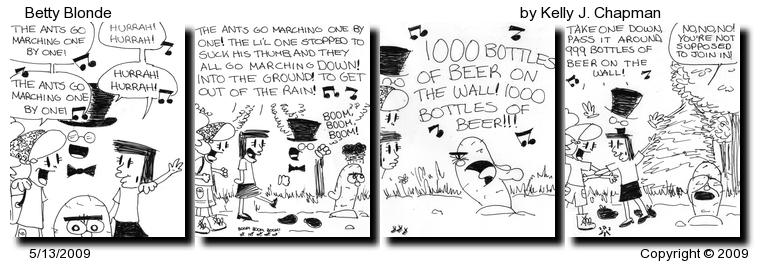
Click here or on the image to see full size strip.
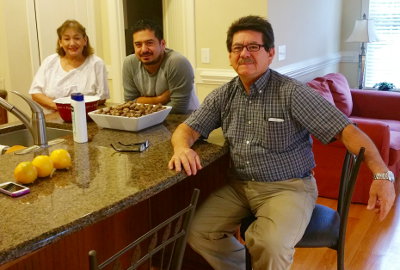
Irma, Beto and Juan (left to right)
We are really happy to have visitors for Thanksgiving this year. Lorena’s Aunt Irma, Uncle Juan made their way from San Antonio to Dallas so they could ride from there with Cousin Beto and his wife, Denise and their three little girls to spend Thanksgiving with us. We are very excited to have them here. There is no downside to having three well-behaved little girls in the house.
Last night we spent at least a half an hour looking for the kitties. They are on the search again.
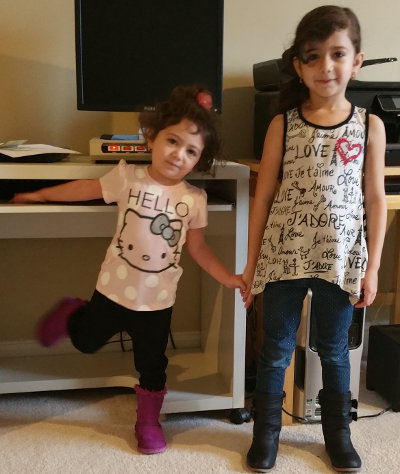
Denise (3) and Valeria (5)
Betty Blonde #214 – 05/12/2009
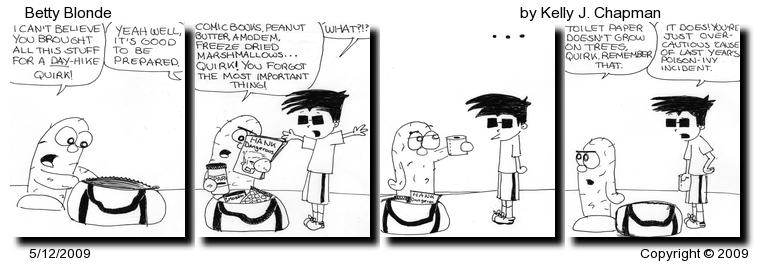
Click here or on the image to see full size strip.
Here is a little girl signing Christmas songs in her schools Christmas program for her two deaf parents.
Betty Blonde #213 – 05/11/2009
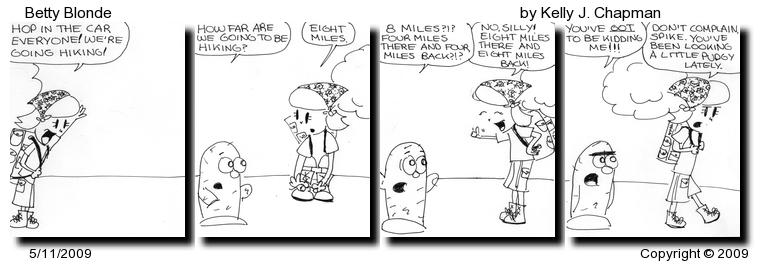
Click here or on the image to see full size strip.
What you see below is a little program I have worked on over the last week or so. It does not look like much, but there is quite a bit under the hood. The GUI is built with something called PySide which is an open source version of the wonderful C++ Qt libraries in a Python wrapper. It is amazing how easy it is to use. I knew nothing about it less than a week ago. In addition, I built a C++ capture library based on OpenCV (I will switch to camera specific libraries when we decide what camera we want to use for our project). I then used SWIG to add a Python wrapper around the library. I write this, not because I think it is particularly interesting to anyone, but because I am having a great time learning some new things, there appears to be a lot more coming and it will be good to remember what a good time I had doing it a few years from now.
You might notice that I got a little jump on No Shave November. I decided to go with the beard, partly because I have been away from home quite a bit over the last month, so Lorena has not been able to wrestle me down and shave it all off. If I can just last until Thanksgiving…
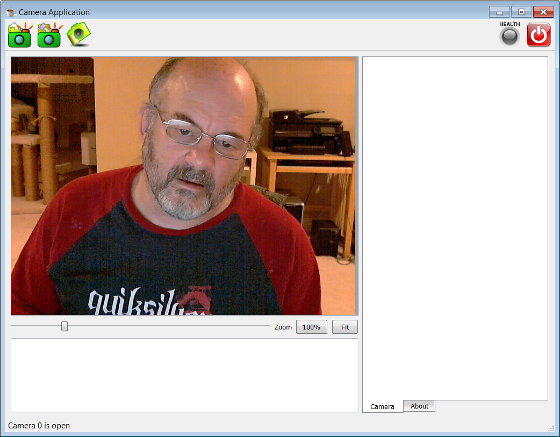
Betty Blonde #212 – 05/08/2009
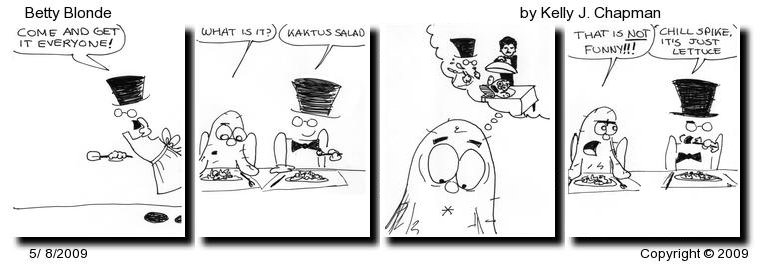
Click here or on the image to see full size strip.
Charles Murray, co-author of one of our favorite books, The Bell Curve, makes some very cogent observations about the importance of stay at home wives and their great contribution to American society in this article at the American Enterprise Institute website. He very carefully makes the distinction between stay at home wives and stay at home moms, then says this:
The point is that many of the important forms of social capital take more time than a person holding a full-time job can afford. Who has been the primary engine for creating America’s social capital throughout its history, making our civil society one of the sociological wonders of the world? People without full-time jobs. The overwhelming majority of those people have been wives.
This seems precisely right. Murray acknowledges that stay at home wifehood is not for everyone and not even possible in many cases. It is obviously true that stay at home wives are even less understood and appreciated in our society than stay at home moms. It also seems obviously true that they contribute greatly to our society and are made possible by marriage as it has been practiced in America up until about twenty years ago. It is a great article and very timely for Lorena and I now that we are empty nesters. Lorena is trying to figure out what to do next (I need and want to keep working). These are not easy things to figure out.
Betty Blonde #211 – 05/07/2009
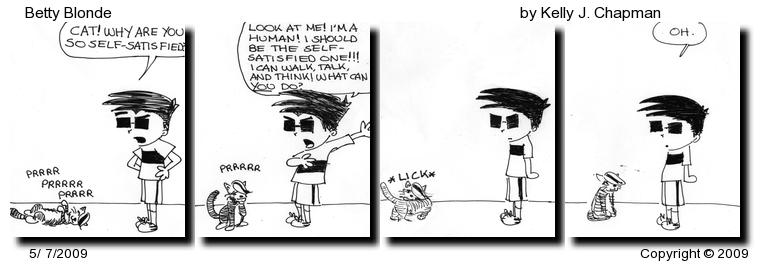
Click here or on the image to see full size strip.
This post is part of a narrative history of our homeschool. It is about why we chose to homeschool, what we did and how we did it. It is about our failures and frustrations as well as our successes. The plan is to make an honest accounting of it all for the benefit of ourselves and others. This is a work in progress which was started in late October 2014 after the kids had already skipped most or all of high school, Christian had earned a Bachelor’s degree in Mathematics (Summa Cum Laude), Kelly had earned a Bachelors degree in Statistics (Magna Cum Laude) and they were ensconced in funded PhD programs on the West Coast. I add to the narrative as I have time.
Kelly’s first grade year, our first year of homeschool, was a thing of beauty. We did “home-preschool” with Christian, too, so he would not feel left out. We loved every minute of it, but it was a lot of work–more work than I could sustain for two kids over the decade they would be in school. We followed the Classical Education, grammar stage methods from The Well Trained Mind book described in the previous post in this series. It really was wonderful.
Our only problem had to do with the fact that, unlike many homeschools, I (the dad) did all of the academic parts of the homeschool. That is not to say Lorena did not do anything. She did just as much as I, if not more–assuring the kids stayed on track to finish their assigned materials during the day, running to the library, zoo, piano lessons and a million other events, coordinating materials purchases and the million other administrative tasks required to do homeschool the way we wanted to do it.
I loved the entire process–identifying materials, buying materials, making schedules, making the overall plan, making and updating the daily plan and, especially, sitting with the kids to read, learn math facts, memorize Bible verses. I did this for Kelly’s entire first grade year. Coupled with my full time job that required an hour and a half of driving to and from work, I had virtually no time for anything other than work, church and homeschool.
Kelly spent two or three additional hours every day to work through a to-do list of assignments. She loved it. Mostly it consisted of reading some books, working on math, doing some art, writing reports and in her journal and that sort of thing. It was stuff she probably would have been doing anyway. We gave Christian a list of about a half an hour worth of pre-school things to-do, mostly consisting of doing a worksheet or two and participating in Kelly’s art projects with her.
Every night, when I got home from work, I sat with both of kids to teach, correct homework, memorize and read for two or three hours more hours. After the teaching and correction, I needed to spend another hour or so per night to go through the materials for the next day and assure they were at the right level and taught what I felt we should cover for each of the materials. I made up a list for each kid on the computer that Kelly could understand (Lorena helped Christian) and printed it out so they could no exactly what was required that next day.
Then, every weekend, I spent at least half a day in bookstores, art stores and libraries, hunting down materials. I never hit every subject on every weekend, but it was very rare when we had a weekend available only to relax and hang out with the family. Really, it was too much. I knew I could not maintain such a pace of work as long as I had a full time job. We decide we would find a different way to homeschool or put the kids in government school the next year. We decided on government school for the next year for a number of reasons I discuss in the next post in this series. In addition, I delve more deeply into the topic of why we moved away from the Well Trained Mind in another post here.
We will never regret having done it exactly what we did for Kelly’s first grade year. We might have been exhausted, but we accomplished a lot with much joy. It served the kids well. They loved the program and the materials, were not burdened with too much work and learned a lot. Lorena and I knew the later grades would require even more work as Christian moved into “real” homeschool and the materials got more difficult. So something had to change if we wanted to continue homeschooling.
Betty Blonde #210 – 05/06/2009

Click here or on the image to see full size strip.
Every time I think I want to leave Raleigh, Lorena sends me a picture of the view from our back patio and I change my mind. It might not be to everyone’s taste, but we really like it. Lorena gets her hot summers. We get four distinct seasons with a little snow in the winter. It is ALL good.

Betty Blonde #209 – 05/05/2009
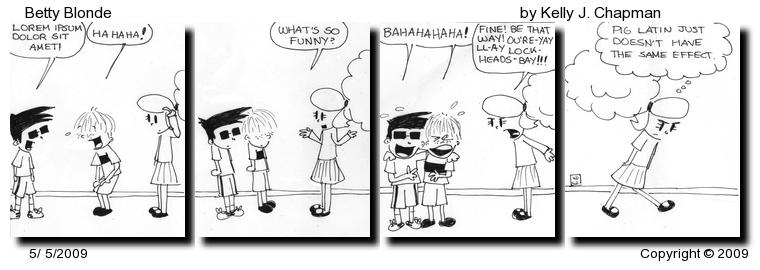
Click here or on the image to see full size strip.
The small team of engineers with whom I work spent last week, the entire weekend and yesterday putting the final touches on two of the retinal imaging cameras we designed so they can be shown at a conference in Colorado starting tomorrow. Everyone who has done real engineering has participated in this type of sprint to the finish. Really, I do not get a lot of satisfaction out of my work unless I get to do something like this a couple of times per year. We worked 16 hour days and barely made it, but the cameras will do well at the show.
The times when I work hard like this are the times I remember and cherish most about my work life. These times are when big advances are made in product understanding and, more importantly, lasting friendships are built. I love that. At the same time, now we are all completely fried. One of the guys took the day off. I am going to work on my really fun programming project (cameras, Python, SWIG and C/C++) and get back to blogging. We will have to work hard until Christmas, then take it up again for a rush to another product milestone in March, then it will be on to a new product for me.
So, that is why I have missed a few days of blogging. I hope to continue my Our Homeschool Story tomorrow.
Betty Blonde #208 – 05/04/2009

Click here or on the image to see full size strip.
I have been given a project at work to write a program to control a camera, some motors and I/O and perform some machine vision. That is pretty much what I do anyway, but the high level parts of the project are to be developed in Python with the low-level, “need to go fast” parts to be written in C/C++ with a Python wrapper. I am going to be able to develop some new skills and play with some new toys, but will have to slow down my Our Homeschool Story posts a bit. I hope to keep going but not a post a day, at least for awhile.
Betty Blonde #207 – 05/01/2009
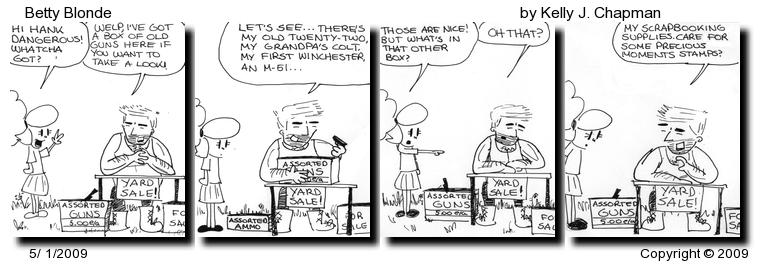
Click here or on the image to see full size strip.
This post is part of a narrative history of our homeschool. It is about why we chose to homeschool, what we did and how we did it. It is about our failures and frustrations as well as our successes. The plan is to make an honest accounting of it all for the benefit of ourselves and others. This is a work in progress which was started in late October 2014 after the kids had already skipped most or all of high school, Christian had earned a Bachelor’s degree in Mathematics (Summa Cum Laude), Kelly had earned a Bachelors degree in Statistics (Magna Cum Laude) and they were ensconced in funded PhD programs on the West Coast. I add to the narrative as I have time.
I talked to the four or five people I knew who homeschooled and checked out some books from the library to kick-start our homeschool program. The Well-Trained Mind: A Guide to Classical Education at Home by Susan Wise Bauer and Jesse Wise was all the rage at the time. I bought a copy of the book and really liked what I read. We had some very close friends down in San Diego with three kids about the same age as ours who were going through the same process. With not a lot of additional information, I bought into the very strong case made in the book for Classical Education.
The three stages of Classical Education, Grammar, Logic and Rhetoric resonated with us. The kids were already in the Grammar stage that features rote memorization of facts and rules (for arithmetic, grammar, spelling, etc.). The process, at least for our kids, was a truly enjoyable one that gave them the building blocks for future learning. They loved to memorize stuff and learn rules and facts, but they especially enjoyed it because we did it with them and lots of others (aunts, uncles, grandparents, neighbors, friends) loved to listen to them recite what they learned or hear them read a passage from a book.
The Well-Trained Mind calls for the parent to develop a program that follows a very thoughtful set of educational goals and material to be covered to meet those goals. So I developed a first grade overview/plan to cover those things called for in the book. We traipsed down to the Christian bookstore where we found Christian’s Explode the Code books that had a large homeschool section and bought the materials and books we need to implement our plan.
We still love and believe in Classical Education, but I should say a few words about how it is practiced in much of the homeschool community and many Christian Classical Education schools. We believed and vigorously practice the ideas and methods called for in the grammar and logic stages, but have found that the outcome of many Classical Education rhetoric stage programs is the production of little lawyers focused more on winning arguments than contributing to society. I have written about it a couple times on this blog here and here. Luke Holzmann’s father (Luke is our friend from the Sonlight blog) wrote about this in an amazingly insightful post here. Actually, I found Luke’s Father’s post from comments made by Luke by in May of 2009 titled “Say It to My Face”, but the link was broken. Maybe he can help us with that.
We eventually went away from the methods described in The Well-Trained Mind to something we believe was much better both in terms of our kids education, but also in terms of our own sanity. Of course, I will describe those new methods in later posts in this series. Nevertheless, the things we learned from The Well-Trained Mind served us well during the year we used it and we have no regrets in that regard. I will describe our implementation of that system in the next post.
Betty Blonde #206 – 04/30/2009
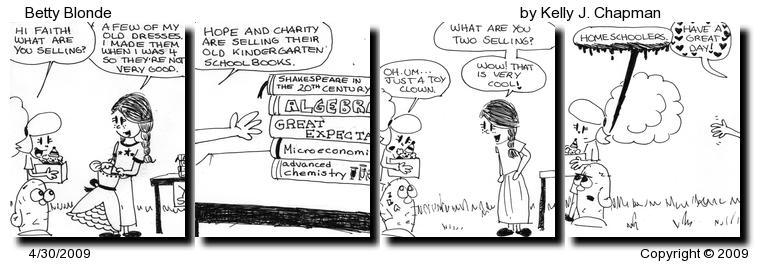
Click here or on the image to see full size strip.
An article titled Is School Overrated? High School “Dropout” Makes Affordable 3D Printer in Forbes got me to thinking about a vigorous discussion we have at my work on a fairly regular basis. We are (currently) an intellectual property company made up mostly of engineers and scientists. It is fascinating the technical/professional divide in the company, and it is a pretty big divide, is not your standard scientist vs. engineer divide. Everyone kind of agrees the divide is between those who “work from first principles” and use intuition and those who take a more empirical approach, performing a few experiments and take some measurements before choosing a path to make improvements and innovations. Of course, both groups follow both paths to a certain extent, but the intuitionists (if that is a word) tend to start with a single approach then tinker and tinker until something works while the scientists tend to identify the theoretical possibilities and plan experiments to figure out which one is best and to identify unknown problems.
Virtually everyone on the team that does invention has at least a Masters degree and most have PhD’s. We all, pretty much, get the math in the areas in which we work. It would be my contention that people with formal education in the science can become good tinkerers AND good scientists while those who do not have the formal education at a high level struggle when it comes to science and tend to relegate themselves to tinkering. People who want to learn undergraduate level math can do that without ever going to college through use of things like Khan Academy and other online tools. It is possible to get additional, graduate level math skills out of books, but it gets much harder. To be an Olympic class judo player, one needs to practice with other Olympic class judo players and train under Olympic class coaches.
I think we need both scientists and tinkerers, but as our understanding of physics, chemistry, biology and other highly technical areas of science gets more complex, it will be harder to compete without engagement with the best thinkers in any given field. The example above is about someone who is finding innovative ways to combine and use technology that has already been invented. Inventing something new requires much deeper knowledge than the skills required to create the things described in the article. The “maker” in the article is working with people from MIT who have deep technical skills and formal knowledge, so maybe he will someday move from tinkering to science.
Betty Blonde #205 – 04/29/2009
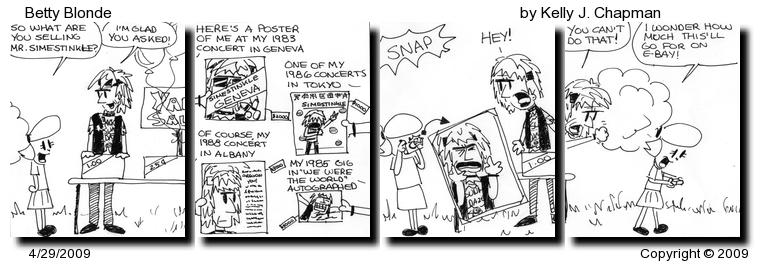
Click here or on the image to see full size strip.
This post is part of a narrative history of our homeschool. It is about why we chose to homeschool, what we did and how we did it. It is about our failures and frustrations as well as our successes. The plan is to make an honest accounting of it all for the benefit of ourselves and others. This is a work in progress which was started in late October 2014 after the kids had already skipped most or all of high school, Christian had earned a Bachelor’s degree in Mathematics (Summa Cum Laude), Kelly had earned a Bachelors degree in Statistics (Magna Cum Laude) and they were ensconced in funded PhD programs on the West Coast. I add to the narrative as I have time.
The purpose of kindergarten is usually to get kids acclimated to a traditional school environment while giving them some of the basic skills they will need to function properly in first grade. That is exactly what happened in the Christian kindergarten Kelly attended in our neighborhood. There was nothing deeply negative about the experience at all. Some of her kindergarten was very positive–memorization of Bible verses (we especially enjoyed Psalm 8), visits to local nursing homes to sing for the people living there and a few new friendships. We were glad we did it.
We saw though, that moving forward, traditional school was not a great place for academic advancement nor for healthy socialization. There was nothing she learned in Kindergarten she did not already know. We pretty much expected that, but when we investigated what would be covered in her first grade year, we found she would not move forward there either as most of the students would need to continue improving their reading skills and start on basic arithmetic. All of this would occur in a social setting, while much better than the local government school, whose predominant feature was still a room full of 20-25 same age kids with one teacher and a part time aide.
When kids leave school, they almost never enter such a homogeneous, unhealthy “Lord of the Flies” social environment for the rest of their lives where a group of relatively unsupervised kids socialize each other. Kelly had lots of friends from swimming lessons, the neighborhood, church, library and other activities where there were people of different ages and more adults per child than in a traditional school setting. That seemed like a much healthier social setting than that of a traditional school. Even in kindergarten we could see a pecking order get established. The competition to wear the “right” clothes, play the “right” games (Pokeman was the rage at the time), watch the “right” television shows had already started. That we did not have a television in our home became a topic that needed to be explained. It was pretty low grade competition at that age, but it had definitely started.
We really did not care whether or not Kelly learned anything in kindergarten. She was only in school a few hours per day and we kept teaching her new stuff at home anyway. That would change when she went to first grade. We wanted her to actually learn things then. That and the social aspects of the artificial social environment in traditional school settings gave us pause. We started considering homeschool toward the end of Kelly’s kindergarten year. At the end-of-the-year assembly, they had Kelly read a passage from a book none of the other kids could read and implied the school had taught her those reading skills. That pushed us even further down the road toward homeschooling.
Betty Blonde #204 – 04/28/2009

Click here or on the image to see full size strip.
This post is part of a narrative history of our homeschool. It is about why we chose to homeschool, what we did and how we did it. It is about our failures and frustrations as well as our successes. The plan is to make an honest accounting of it all for the benefit of ourselves and others. This is a work in progress which was started in late October 2014 after the kids had already skipped most or all of high school, Christian had earned a Bachelor’s degree in Mathematics (Summa Cum Laude), Kelly had earned a Bachelors degree in Statistics (Magna Cum Laude) and they were ensconced in funded PhD programs on the West Coast. I add to the narrative as I have time.
Homeschool was not even on our radar when Kelly was at an age to start kindergarten. We lived in a fairly poor government school district just a couple of blocks from a low performing elementary school in a suburb of Portland, Oregon so we were not too excited about putting Kelly there. We looked around and found a high performing Christian elementary school about a mile away. We interviewed the teachers there and decided to give it a try. Kelly enjoyed herself and had quite a good year there, socially. The next post in this section of Our Homeschool Story series describes our experience at this traditional Christian school.
Toward the end of Kelly’s kindergarten year, a group home for juvenile delinquents moved into the house next to us so we decided to move. We sold our house and bought another one in a more affluent suburb with much better schools, still in Portland. We could not afford to put Kelly into any of the private schools in the area, so we considered putting her into the local government elementary school. We wanted to investigate other options because Kelly had not learned anything in her experience in a traditional kindergarten. We found that, in Oregon, a parent has the right to postpone putting them into school until they are seven years old. We decided we would take that year to push Kelly further ahead by homeschooling her.
The third post in this section of the series describes my first foray into learning how to homeschool. I took a fairly typical path reading The Well Trained Mind: A Guide to Classical Education at Home by Susan Wise Bauer and Jessie Wise. I talked to lots of friends, figured out the laws, identified curricula and did all the stuff I thought might prepare me to teach the kids at home. The fourth post in this series describes what we did, how we did it and how we thought. Without this first pass at homeschooling, I do not think I would have had the will nor knowledge to make what I believe were the great (for us) choices we mad in our second pass at homeschooling several years later.
Betty Blonde #203 – 04/27/2009

Click here or on the image to see full size strip.
This post is part of a narrative history of our homeschool. It is about why we chose to homeschool, what we did and how we did it. It is about our failures and frustrations as well as our successes. The plan is to make an honest accounting of it all for the benefit of ourselves and others. This is a work in progress which was started in late October 2014 after the kids had already skipped most or all of high school, Christian had earned a Bachelor’s degree in Mathematics (Summa Cum Laude), Kelly had earned a Bachelors degree in Statistics (Magna Cum Laude) and they were ensconced in funded PhD programs on the West Coast. I add to the narrative as I have time.
I described how Kelly learned to read at age four without a lot of planning on our part in the last chapter. We actually worked hard at a lot of things that helped her get there like memorization, phonics games, making interesting books available to her and reading aloud, but it was not part of some greater plan. Christian is 15 months younger than Kelly. When we saw what worked with Kelly, we just thought we would do the same thing with Christian, but with a lot more planning and organization. We did exactly that and it did not work.
We continued to read aloud to Christian. He loved it. We played the same phonics games that Kelly played when she learned to read and with equal success. We did lots of memorization. We ran our fingers under the words of “easy reader” books as we read them. Christian got great joy out of it all, but did not make the leap to reading. A few months after he turned four, we decided we needed to change our plan. We kept doing what we were doing (with little or no reading progress, but Christian loved it) while I investigated other reading programs.
About that time, we sent Kelly to a local kindergarten that used the Spalding method so we tried that with Christian. We quit after a couple of weeks because it completely killed the joy of reading for both us and for Christian. I continued to read as much as I could on the subject and continued to try things for the next several months, but nothing really clicked. At the end of Kelly’s kindergarten school year, we moved into a new house in another town so a couple of more months went by without a whole lot of concentrated effort. Then, literally just seven weeks before Christian’s fifth birthday, we were looking at books in a Christian bookstore in Beaverton that had a large homeschool section and I found a series of books titled Explode the Code.
Explode the Code looked like something Christian might like to do. It consisted of a series of workbooks that systematically taught children phonics and built their vocabulary. I liked the books. I was pretty sure Christian would like the books, too, especially if I sat with him and did them. I was very much less confident the work he did in the books would lead to his ability to read. I was completely wrong.
While we were at the store we went through several of the books to find the right level with which to start. I think we started with Explode the Code 3–Reader Rabbit had at least gotten him that far. So that night and virtually every night for the next five weeks, Christian and I sat down on the carpet for fifteen minutes while I watched him do Explode the Code exercises. We actually used the oven timer so that we would do exactly fifteen minutes. We made it through about book 8 and Christian was a reader. We replaced Explode the Code with “easy reader” books and moved on up to Junie B. Jones within less than a month.
Do we think Explode the Code was the system/program/method that actually taught Christian to read? Well, kind of–it is a great program that we highly recommend. In reflecting on it, though, we think his learning to read had more to do with a couple of other things. The first and most important thing was the timing. Christian saw Kelly read and get all kinds of praise, even from her kindergarten teachers, for her ability to read so well. As Kelly got better at “reading in her mind” she was less willing to read aloud to Christian so he no longer had as much access to the books he loved, especially Calvin and Hobbes. He also saw that it was important to Lorena and I that he learn to read. We spent lots of time on it and had great joy when he read well.
I might not be precisely right when I say that Christian learned to read in a different way than Kelly. Timing probably had more to do with it than method. Both of the kids learned to read when it became important enough to them to make the effort.
Betty Blonde #202 – 04/24/2009
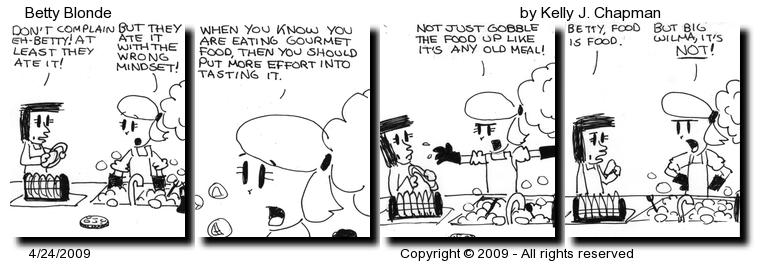
Click here or on the image to see full size strip.
I have a cousin who is a government school teacher in Nevada. She is very, very good at her job as is attested by the scores of her students on national normed standardized tests both in terms of the scores themselves and the improvement from previous years. We regularly talk about a lot of things on the phone, but every conversation eventually makes its way around to education. The best of both homeschoolers and and traditional schoolers is that they maintain focus on education. I certainly believe that our country is in big trouble because of the state of our public school system.
That being said, I think the problem is bigger than the education system. The reason the education system is in trouble is that our culture as a whole is in trouble. The reason the schools are failing is because the students, teachers, parents and administrators are all a product of a culture on the move toward secular humanism and paganism, even in the church. Still, there are people out there fighting the good fight to educate our children. We should cherish them. They have to deal with things in the classroom that are way outside the venue of teaching.
My cousin in Nevada has a great blog called Roll Call Tales. If you want to read a great blog by a teacher who is giving it her all down in the trenches, this is a great one. She blasted out a rant there yesterday titled Pray for Teachers that is well worth reading. You should read the whole thing, but here is an excerpt.
Pray for teachers. Please. In one corner we are talking to the child whose mother may have ended her life with pills when she was three and she “doesn’t even know what she liked.” In another corner we are working with a student who has every excuse in the world to not do a thing and a parent that backs him up. Then he wants the grade adjusted because effort doesn’t always equal ability. The bully that is learning to bully from home? It has to be from home right? The quiet one in the corner that you have to beg to speak. The English-Language learner that looks at you in panic every time you call on them. Please don’t call on them. The student that is obsessed with food. The student isn’t malnourished and you can’t figure it out. Until you find out the cupboards are locked at home and food is taken out of their hands and eaten by the parents. The student that cries whenever the teacher has to leave because being left in the classroom with the “scary” sub just fills them with anxiety and they can’t even think. The student whose eyes fill with panic when you say the word “test” or “writing” and you have to find a way to reassure them they can do this. Just getting words on a page that make “sense” is the most amazing accomplishment. The students whose eyes sometime sparkle and sometimes look so flat and dead and not there, You are chilled wondering what put that look there.
She wins some and she losses some, but she keeps on fighting the fight. It is worth it.
I ran into a great article in The Blaze that very succinctly explains, with graphics, how much more money you will make if you:
It also explains how much additional money you will make for each lecture you attend and what will change if you get A’s and B’s rather than C’s and D’s. It breaks it down by degree type, not surprisingly the hard sciences and engineering have the biggest economic impact on ones lifetime income. The people who did this are from eBay. Pretty impressive. Here is how the research is described in the article that points to the eBay work:
Using data from a variety of sources, including the Census Bureau and the Bureau of Labor Statistics, the team at eBay Deals produced an infographic breaking down exactly how different degrees — and even individual grades — correlate to extra earning potential over the course of a lifetime.
Now if they could only break lifetime income down based on whether you got your high school diploma from a homeschool, government school or private school.
This post is part of a narrative history of our homeschool. It is about why we chose to homeschool, what we did and how we did it. It is about our failures and frustrations as well as our successes. The plan is to make an honest accounting of it all for the benefit of ourselves and others. This is a work in progress which was started in late October 2014 after the kids had already skipped most or all of high school, Christian had earned a Bachelor’s degree in Mathematics (Summa Cum Laude), Kelly had earned a Bachelors degree in Statistics (Magna Cum Laude) and they were ensconced in funded PhD programs on the West Coast. I add to the narrative as I have time.
I wrote about how Kelly learned to read in a previous post that also featured this rather pixelated video with scratchy audio. We had read Edward Lear’s The Owl and the Pussycat so many times starting about when Kelly was three she started to memorize it. As I believe is fairly common she knew it well enough to correct us when we got distracted and read something incorrectly. That is when we realized that she had the poem memorized. After that, when we read, we started to drag our finger under the words we read until Kelly caught on and wanted to do it herself. Pretty soon, she began to make associations between the words as we said them and their appearance in the book.
About that same time, Dalton, a boy who lived next door of about the same age as Kelly and Christian got into video games. I believe his favorite was something called Monster Truck Madness. The kids wanted their own video games, but if we were going to get sucked into the computer game vortex we wanted to exercise some control over them. We did this by getting some educational games including Freddi Fish, Putt-Putt and Pajama Sam that featured cartoon characters in adventure games that required logic skills. The kids got into the habit of sitting on my lap to play the adventure games because they were a little bit scary for a three or four year old.
After the kids had played the adventure games for awhile we found a series of phonetic reading games called Reader Rabbit. The games required the players to make decisions based on the sounds of letters, letter combinations and, finally, words shown on the screen. Because she sat on my lap when we played the adventure games, Kelly wanted to sit in my lap to play Reader Rabbit, too. So, every night when I got home from work, we would sit for fifteen minutes and play Reader Rabbit together with me mostly just acting as the chair and watching Kelly play the game. I do not think I can overstate the impact of my presence with Kelly in the playing of the games. She was excited for me to sit down with her the instant I got home. I do not believe, at that age, she would have been willing to sit down for nearly as much time on her own.
The games taught her how to sound out words. She already had knowledge about the appearance of some common words from her memorization of The Owl and the Pussycat. By the time we put a new “easy reader” book in front of her that she had never before seen, she already understood the concept. She read aloud to us a little in the beginning, but rapidly graduated to books like the Junie B. Jones series which she read on her own. We had many Calvin and Hobbes comic books in the house, too. Kelly and Christian “read” those books endlessly. When she learned to sound out words, she tried to work her way through some of these comic strips, learning in the process that there are more things at which to laugh in a comic strip than just the pictures.
Kelly could read fluidly when she was four, well before she got to kindergarten. Of course, we foolishly thought we were great teachers. We went through the precise same process with Christian that had worked so well for Kelly and failed miserably. It was not Christian who failed. It was us. We did not take into account the vast differences in the way our kids learned. He had great joy in learning to read at age four, too, but it was by a completely different process that required a good chunk of additional work on our part. That is described in the next post.
Betty Blonde #201 – 04/23/2009
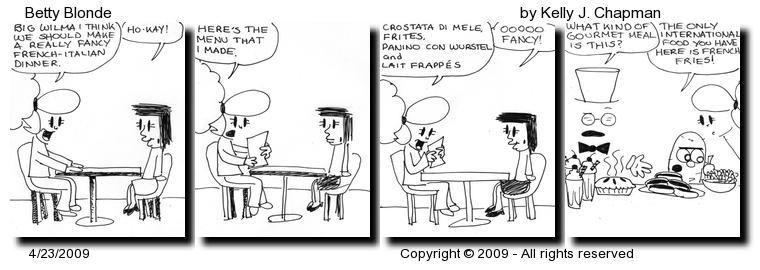
Click here or on the image to see full size strip.
A post over on the Powerline Blog points out an amazing video made by some concerned citizens about the ongoing state of malaise in the State of Oregon. It gives a very clear explanation of the reasons I am not willing to go back there for anything other than a visit. My company has announced they will move to Oregon next year. They would like me to go along. I think that would be a hard thing to do. I am a native son of Oregon (family first arrived in 1846 on the Applegate Trail). My parents and all my siblings live there. I still believe it is, by far, the most beautiful state in the union. It is also one of the most intolerant states in the union–especially to people with my worldview. The following is a quote from the Powerline Blog post that captures the flavor of both the video and the post itself. I especially like the last line in this quote.
Even aside from the Obamacare fiasco and Kitzhaber’s ethical problems, the state has been in relative economic decline for more than two decades, with an unemployment rate consistently above the national average and income growth lagging the national average. Its public school performance is dismal, without the usual excuses of a large low income or minority population. Yet no one seems to connect any of these difficulties to the dominance of one political party. Perhaps you’ve taken in an episode of Portlandia? Believe me, as a frequent visitor to Portland (the city where young people go to retire), it is indeed a documentary.
If you don’t want to watch the whole 30 minutes, you can find some shorter videos by the same guys on the same subject here. On the other hand, if you wonder why I did my graduate work in Texas and currently live in North Carolina, watch the whole thing.
This post is part of a narrative history of our homeschool. It is about why we chose to homeschool, what we did and how we did it. It is about our failures and frustrations as well as our successes. The plan is to make an honest accounting of it all for the benefit of ourselves and others. This is a work in progress which was started in late October 2014 after the kids had already skipped most or all of high school, Christian had earned a Bachelor’s degree in Mathematics (Summa Cum Laude), Kelly had earned a Bachelors degree in Statistics (Magna Cum Laude) and they were ensconced in funded PhD programs on the West Coast. I add to the narrative as I have time.
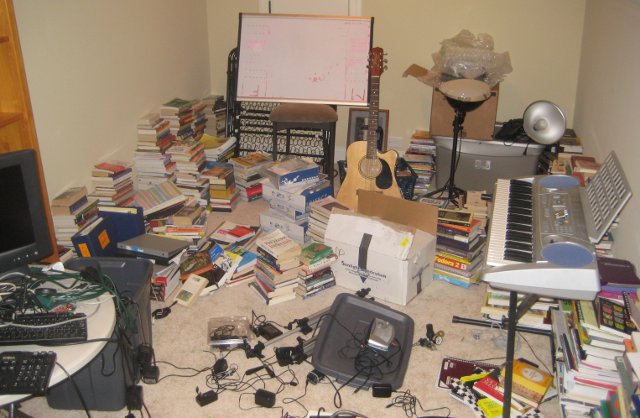 There are a fairly large number of studies that show that the greater the access to books in a home the greater the academic advantage of the children who live there.1 This is another one of those things for which we would like to take credit but cannot. Both Lorena and I grew up in households with no television, no computer games and no video-game consoles. The only alternative was books, so even when our budget was tight, books were high on our list. We decided when we got married we decided we wanted the children to benefit from the both the lack of television and an abundance of books.
There are a fairly large number of studies that show that the greater the access to books in a home the greater the academic advantage of the children who live there.1 This is another one of those things for which we would like to take credit but cannot. Both Lorena and I grew up in households with no television, no computer games and no video-game consoles. The only alternative was books, so even when our budget was tight, books were high on our list. We decided when we got married we decided we wanted the children to benefit from the both the lack of television and an abundance of books.
We had (have) books everywhere. The picture to the left is the niche in the bonus room where we store some of the book and homeschool project overflows. From the time the kids were old enough to understand, we read at least an hour a night to them including weekends. As they got a little older we often read much more than that. We started reading some of books the old books from my childhood that I loved–Homer Price, Henry Reed, Laura Ingalls Wilder. It was fun for them and fun for us. The kids had their favorite books and, as is the wont of young children, we read some of the books repeatedly.
The kids were so dedicated to their books, Lorena had a little bit of a struggle managing them. I actually walked into the house one day after work and heard Lorena yelling at the kids, “QUIT READING!!!” because they read so much. Lorena often had to take away their books to get them to play outside the house or to do art or build something with legos. They liked that, too, but perusing books was like breathing to them.
In the early days we spoke Spanish to them and read to them in Spanish and English. As they got up toward elementary school age, it got harder and harder to find Spanish language books so we transitioned to mostly reading to them in English while continuing to speak only Spanish to them. They could both speak both languages quite well, but we felt if either of us would have quit speaking to them in Spanish, their skills would have diminished because all the neighborhood kids, people from church, and everyone in my family, the only family close enough to visit regularly, spoke only English to them.
We had neither enough books nor enough money to buy sufficient books to satiate the kid’s desire for them so Lorena began to frequent whatever local library was available. I remembered them going to the library at least three days per week at that age. I asked her whether that was right, whether she actually went that often. She said they often went more than that and almost never less. Each kid had their own cloth bag to take books to and from the library. The checked out as many as they could every time and we frequently needed to do frantic, last minute searches to find books to get back to the library so we would not be fined.
So I guess we qualified as one of those households where the kids had access to books. One particular book that we actually owned and that we read time and time again was a beautifully illustrated picture book version of Edward Lear’s poem, The Owl and the Pussycat. That book was instrumental starting a program to memorize stuff. I will talk about that in the next post.
1. The following citation is from a long list of citations on the contribution of access to books in the home to the ability of children to learn to read from this article at the Children’s Literacy Foundation: (Source: Reading Is Fundamental, Access to Print Materials Improves Children’s Reading: A Meta-Analysis of 108 Most Relevant Studies Shows Positive Impacts, 2010). This page asks and answers questions about child literacy with relevant citations of the research. I recommend it highly.
Betty Blonde #200 – 04/22/2009
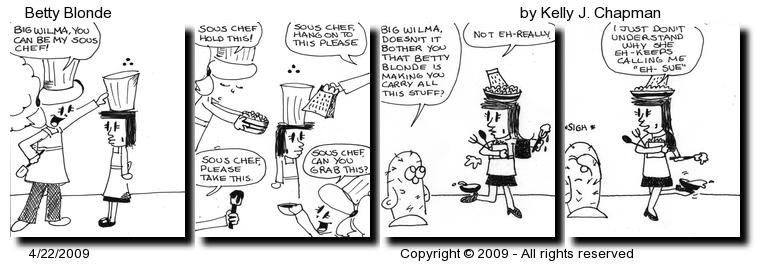
Click here or on the image to see full size strip.
Powered by WordPress & Theme by Anders Norén